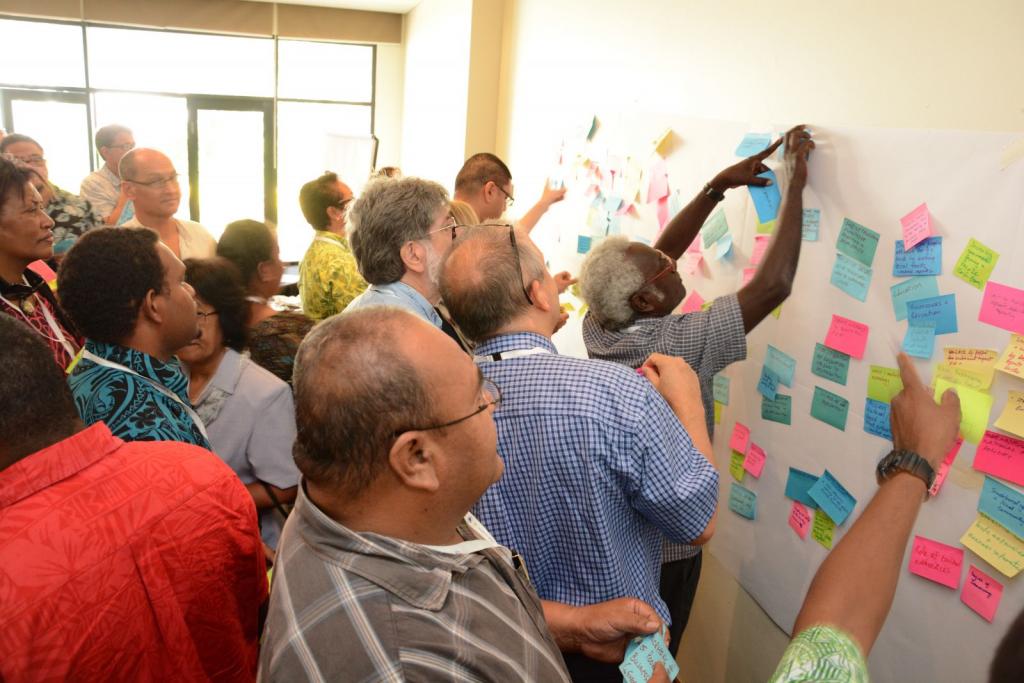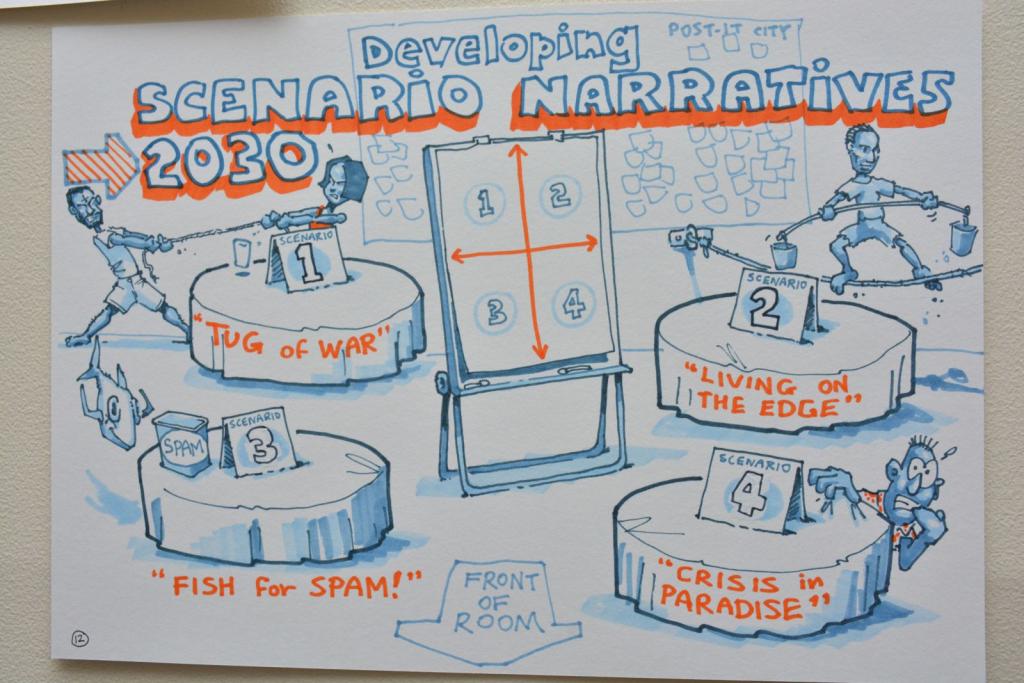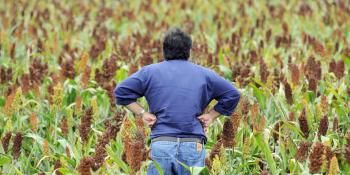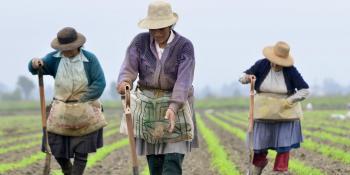Future scenarios approach adopted in the Pacific
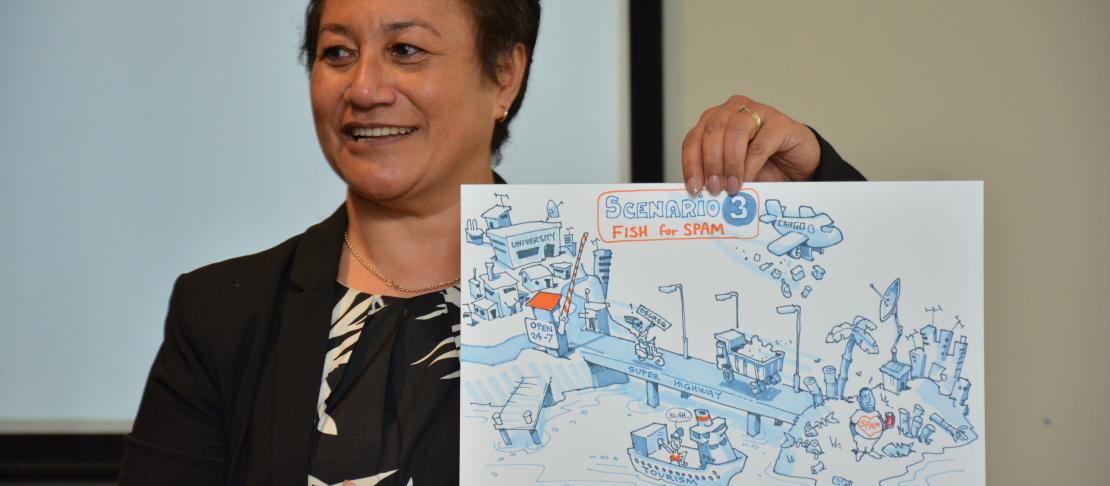
The Secretariat of the Pacific Community adopts the CCAFS scenarios approach to help plan future food systems.
The food system of the Pacific region is changing profoundly. It is under pressure from rapid population growth, urbanisation, a shortage of arable land and an abundance of cheap but nutritionally poor imported food. The food system of the Pacific also needs to change.
Currently, Pacific islands have disproportionally high rates of obesity and diabetes. At the same time, climate change is and will be hitting the region hard. Sea-level rise and ocean acidification are locked in; extreme weather events are expected to become more frequent and intense.
Read the report: Building climate-resilient food systems for Pacific islands
But how will societies and economies manage and respond to these changes and challenges? How will trade policies affect future food security and people's capacity to adapt to climate change? How will the region’s resources be managed and its environments protected? How will societies plan for climate change, demographic changes and the dynamics of the global economy?
Getting a grip on future food systems
The Secretariat of the Pacific Community (SPC) has recognized that a coherent understanding of the challenges which the Pacific food system will soon face is missing. Also missing is an understanding of the impact which climate change will have and clear pathways for action. It was to this end that a diverse group of people from the Pacific region gathered recently in Nadi.
Their mission was to develop future scenarios for the pacific food system, exploring how it might evolve up to 2030 under a changing climate. The workshop was organised by the SPC along with the CGIAR Research Program on Climate Change, Agriculture and Food Security (CCAFS), the CGIAR Research Program on Aquatic, Agricultural Systems (AAS), and the Technical Centre for Agricultural and Rural Cooperation (CTA).
What are Future Scenarios?
Scenarios are ‘what if’ stories about the future. Rather than attempting to forecast a single future in the face of many uncertainties, scenarios identify future drivers of change and then plot out plausible directions that they may take. The CCAFS program, led by a team at the University of Oxford’s Environmental Change Institute (ECI) has created regional scenarios with stakeholders in six global regions.
Learn more about Future Scenarios
Making progress one post-it-note at a time
First, the group in Nadi identified those factors which will have the biggest impact on the future shape of the Pacific food system. Out of hundreds of candidate drivers, two were singled out by the group for exploration:
- The governance of natural resources (which can either become more defined and regulated or largely undefined and unregulated).
- The degree of economic connectedness to the rest of the world (which might end up being high or low).
Combined, these two drivers create four future scenarios. Participants then divided into groups to explore each scenario. For example, one group explored what the Pacific might look like if it becomes isolated from the rest of the world while imposing strong regulations of natural resources.
Groups also discussed how each scenario would affect other drivers of change, as well as a range of other indicators for food security, food systems, climate change adaptation and environments. As a result of this, detailed scenario narratives were fleshed out.
Stakeholdersat the Nadi workshop identify drivers of change: the issues that will help shape the future of the Pacific food systems. Photo: CCAFS.
Four future scenarios identified:
- ‘Tug of War’ (regulated governance of natural resources and high economic connectedness to the rest of the world) is a story of tough choices, clashing values and great opportunities.
- ‘Living on the Edge’ (regulated governance of natural resources and low economic connectedness to the rest of the world) is a narrative of fragile self-reliance and idealism challenged by economic and climatic turmoil.
- ‘Cash Now, Pay Later’ (unregulated governance of natural resources and high economic connectedness to the rest of the world) is characterized by high development and growth at the expense of long-term sustainability, health and increased vulnerability to climate change for the poorest, while others thrive.
- ‘Crisis in Paradise’ (unregulated governance of natural resources and low economic connectedness to the rest of the world) sees the Pacific region overwhelmed by its challenges - population pressures, environmental degradation and climate impacts.
To help demonstrate who wins and who looses in each scenario, the groups created ‘character perspectives’, imagining the everyday lives of people living in these possible futures. In addition, the groups worked closely with gifted artist Roger Harvey, to help bring the scenarios to life.
Visual artist, Roger Harvey, helped to capture the spirit of the scenarios and the process that created them. Photo: CCAFS.
What next? Taking the scenarios forward
In a final session, the group of participants presented each scenario (including very vivid performances of the character perspectives) and discussed what actions were needed to ensure viable food systems within them. Insights for action from the four scenarios were then compared and combined into general recommendations.
Immediately after the workshop, SPC and its partners produced a brief from the workshop. It provides longer summaries of the process and the scenario narratives.
As in the other CCAFS regions, the scenarios will be developed further through quantitative analysis. And they will be used in national and regional discussions about food systems to help guide policy development.
Ultimately, SPC, CCAFS and CTA aim for the scenarios to help inspire more integrated policies that help allow the Pacific food system, and the people who depend on it, take on the challenges of the future and live healthy, prosperous and safe lives.
Learn more:
Joost Vervoort works as a Scenarios Officer, at CCAFS and is based at the University of Oxford. Interested in policies and institutions for climate-resilient food systems? Subscribe to our newsletter.

